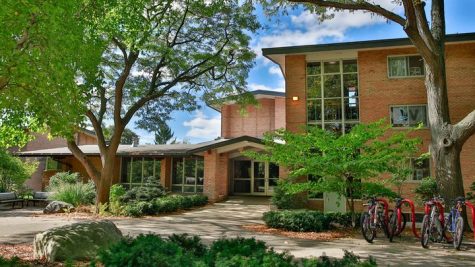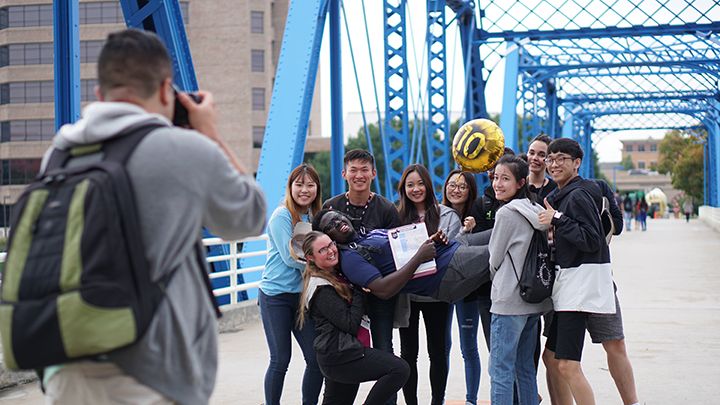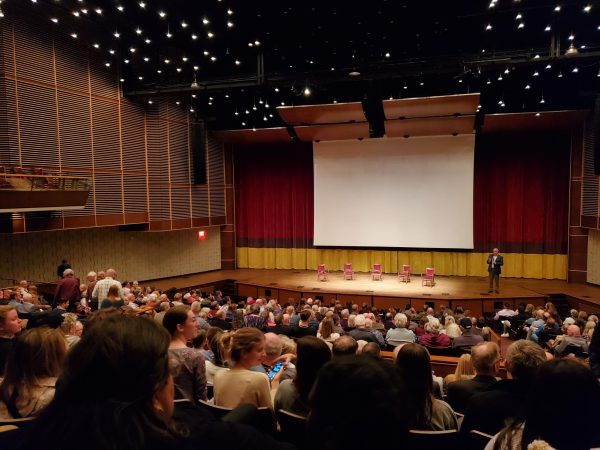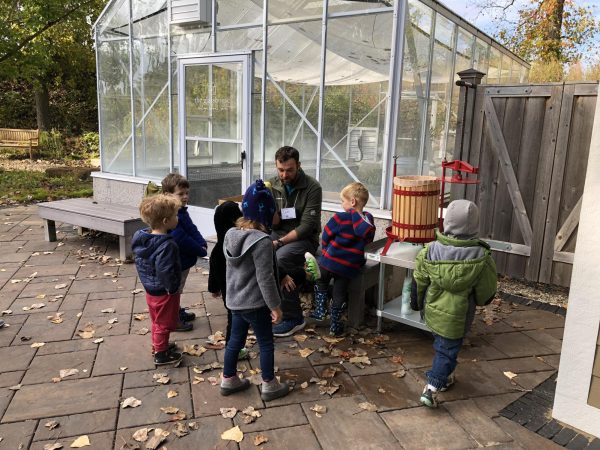Dorm life for international students
International students during orientation
For many international students on Calvin’s campus, stepping into dorm life is like navigating a different world. Chimes spoke with several international students who are currently living in the dorms to hear about their experiences.
Bernard Boadu: “Know that everyone is different.”
Bernard Boadu is a sophomore living in Beets, who also serves as Chimes’ sci-tech editor. Though he grew up in Accra, Ghana, he has also spent some time living in the U.S. because of family. When it came time to pick a college, Calvin stood out because he had heard about it in Ghana, knew a couple of friends there, and it was close to family.
Boadu says he mostly gets to interact with people at his dorm through working as a deskie, and he’s found that people are generally quite open and fun to hang around with. He enjoys the antics that happen on his floor and the Thursday night pizzas that welcome “Fridays at Calvin” prospective students.
Speaking about the people on his floor, Boadu says, “They’re diverse. Everyone is really nice, fun [and] open. I can go to anyone and ask them for something, provided they have it.”
Boadu thinks dorm structures like “open doors, happy floors” have been pretty helpful, but would like to see a space where first-year students can live together without other year levels so that they can bond better.
Though he’s adapted pretty well, Boadu still misses the food and culture of home. He sometimes cooks Ghanaian food on the weekends, and a friend once came over to casually observe, trying to guess at what he was making. The friend had not heard of kenkey, the dish in question, but was able to recognize the ingredients.
Boadu divides his time with different groups of people based on various settings like class or work. His advice for all students is to simply keep in mind that “everyone is different,” whether in values, background and so on.
“[There is] diversity among people even within the same in-group,” says Boadu.
Keziah Paul: “You should want to know about cultures other than your own.”
Keziah Paul is a first-year student living in Eldersveld, and her experience with the dorm has been a challenge. Unlike Boadu, it’s her first time living in the U.S.
Paul, who’s ethnically Indian but grew up in Japan, came to Calvin knowing about the strong international student community but also looking forward to getting to know locals. Because of this, she didn’t request a specific roommate, even though she was coming in with people she knew. Having grown up in an international school environment, she didn’t think she’d have a problem adapting to another new culture at Calvin, but soon realized that was not the case.
“The difference is, [at the international school] I was also with people who also knew how to adapt to cultures, because they too were exposed to different cultures,” says Paul. “I have made local friends… but it hasn’t been easy, and I wouldn’t say the majority are like that.”
Paul says she was excited about dorm life, but after a couple of dorm dinners, she couldn’t help but feel a barrier in how much she was able to interact with her dorm mates because of a disconnect in conversations, whether that was in different senses of humor, hobbies, music, high schools, sports and so on.
“It was just hard for me to click with people… I don’t mean to trivialize [their interests]… I’m constantly trying to adapt to their taste in music or TV shows… for me, it becomes exhausting… what about me?” says Paul, who felt that she invested more in trying to get to know her American peers than they did with her.
“Eventually it’s like, why am I making all the effort? …they’re nice people [but] it ends there,” Paul says.
Paul has also noticed that there are a few people in her dorm who don’t try to acknowledge her presence, even when she greets them. Yet these people are also not shy with each other or when coming into her room to see her roommate, she says.
“[There is] so much life among them, [and] I don’t see that same interest in carrying a conversation [with me]. I’ve tried [but] there’s only so much one person can do,” she says.
Asked about how things could be better, Paul says she would like to see people in dorm leadership positions take more initiative in checking in with students who are far from home. They could also promote international holidays that are celebrated by people in the dorm community as well as events involving the international community, like Rangeela, to help them feel represented in the local community.
“After all, I am the outsider, whether I like it or not,” she says. Resident assistants (RAs) especially have a responsibility to pay attention to people on their floor, she says, but other leaders can also try to foster events that cater to people’s different interests.
Paul hopes her peers can understand “that I’m far from my home, and I’m adjusting, and it’d be so nice if you didn’t add to my homesickness or sadness by expecting me to conform to your norms… I don’t think there’s [been] a day when I haven’t thought about home.”
She suggests that people should show interest in cultivating conversations outside of their own cultural bubble, pointing at the diversity among the international community on campus.
“You should want to know about cultures other than your own… so we don’t feel even more different and lonely than we already do,” she says.
Paul says she has learned not to be apologetic for having her own culture, and to be vocal about her struggles with the broader local community, who may not necessarily recognize the challenges because they do not experience them.

Paula Tangsirisatian: “See each person as a person, rather than a nationality.”
Paula Tangsirisatian is a sophomore living in Heyns, who’s noticed that a difference in values between local and international cultures sometimes creates tension.
“Sometimes I feel like there’s a divide between international and non-international,” says Tangsirisatian, who observes that friend groups tend to be separated by ethnic or cultural backgrounds, without much interaction between them.
Tangsirisatian, an American-born ethnic Chinese who grew up in Thailand, wishes for more talks or activities with an international focus in the dorms. She’s hopeful that this might attract newcomers to dorm events, rather than just the regulars. In particular, she would like to see various cultures of politeness discussed, as she believes it can be a point of conflict.
In her on-campus job as a dining hall student manager, Tangsirisatian notices that some international student workers’ behaviors reflect the more relaxed cultures they come from, and this has caused some tension. For example, while time is more of a suggestion in some cultures, she says, American workplaces expect punctuality. Similarly, because of an emphasis of respect to elders in some cultures, international students may feel shyer than their peers about approaching professors, she explains.
“If locals understood that… it would create less tension and there would be better ways to encourage students [to meet American standards],” says Tangsirisatian.
Tangsirisatian’s advice to her peers is to “see each person as a person, rather than a nationality.” For her, this means more than simply knowing where your international friends are from, but also investing in each other’s lives, which could mean asking to taste their food, asking them what it means to be a minority in America and asking about homesickness.
Tangsirisatian says she still has days where she misses home, where she will not return until after she graduates, but that knowing this was a choice she made helps her to deal with it.
Ivan BienAime: “There are more similarities than differences between human beings.”
Ivan BienAime is a sophomore living in Bolt. He was born in Mauritius and grew up in Ethiopia with ties to family in Nigeria.
BienAime has enjoyed some dorm activities, but hasn’t been as involved as much as he’d like because of his schedule. In particular, he enjoys dorm worship, but finds that the worship style is somewhat “stiff” compared to back home, where there would be more energetic dancing and singing.
“Some of the vibe of dorm worship is minimalistic… you’re still aware if people around you are judging you [for movement such as raising your hands in worship],” he says.
BienAime would like to see greater diversity represented in dorm worship, such as asking people who can speak different languages or people from different denominational backgrounds to teach new songs, adding their personal touch to the worship experience. He hopes that more international students can initiate this kind of sharing, but recognizes that it’s not something that would come easily to himself.
BienAime says it can be tempting to fall into the trap of stereotyping the other, regardless of where you come from. He once observed a group of American students make the assumption that lions and giraffes freely roamed in his Ghanaian friend’s home in the same way that squirrels are common in America. The friend explained that he did not live in a savannah. But BienAime had to unlearn some of his own stereotypes about Americans, too.
“The more you learn about cultures, the better your worldview will be [about reality]… There are more similarities than differences between human beings, especially [with regard to] Americans and international students. But we always focus on the differences,” said BienAime.
Debora Haede: “Reach out to the international students on your floor.”
Debora Haede is a junior who currently serves as an RA on Heyns. She was born in Germany to a Turkish mother and German father, and grew up in Turkey. Haede enjoys the intentional community of the dorms, where there are always people to spend time with.
“You all go through similar things and are able to process things together,” she says.
Haede feels that it is challenging for international students to feel welcomed in dorm activities, which she says tend to cater to American students’ interests, traditions and passions.
“The dorm is an American student’s first support system, while international students usually find that support through other friend groups and organizations,” says Haede.
She did not participate much in dorm activities before, but this year as an RA, she was able to enjoy them more since she gets to plan them and encourage residents to participate.
“Reach out to the international students on your floor,” Haede advises. “Understand why they choose not to attend floor activities, but don’t let that stop you from becoming their friends.”
She recommends having international students represented in dorm leadership positions in order to bring about change in dorm dynamics. Haede feels she has adapted to living in the US, but recognizes there are still many things that are foreign to her.
“I don’t need to fully adjust to everything, but make the most out of it,” she says.
Dianne Cayetano contributed to the interviewing for this article.








